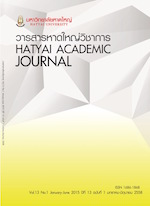Understanding and Managing Procrastination among Thai College Students
Main Article Content
Abstract
Procrastination is an interesting topic because while it has been in existence for a very long time, no one has clearly defined the true reasons why people procrastinate. The majority of college students engage in regular procrastination to attain academic achievement, in spite of the awareness that they will experience stress trying to beat their deadlines. Interestingly, recent research reported that many students actually enjoy beating their task deadlines. In light of this phenomenon, this article was aimed to present theoretical perspectives and empirical evidence to illustrate why students readily adopt undesirable habit. More specifically, this article was aimed to (1) determine reasons why individuals procrastinate in spite of its adverse consequences, (2) explain the characteristics of the two main types of procrastinators (active and passive), and (3) illustrate the consequences, particularly on academic outcomes, of procrastination. There are new directions in the prevention and/or treatment of procrastination which, hopefully, would protect students from its anticipated negative consequences. Moreover, adopting suitable interventions or treatment plans according to the type of procrastinator is bound to help researchers, educators, and psychologists achieve their objectives more effectively and efficiently.
การผลัดวันประกันพรุ่งเป็นพฤติกรรมที่น่าสนใจอย่างมาก เพราะเป็นสิ่งที่ได้ถูกกล่าวถึงเป็นระยะเวลายาวนาน แต่ ก็ยังไม่มีใครสามารถอธิบายถึงเหตุผลที่แท้จริงว่าเพราะเหตุใดคนมักจะผลัดวันประกันพรุ่ง ทั้งนี้นักศึกษา มหาวิทยาลัยส่วนใหญ่มีนิสัยชอบผลัดวันประกันพรุ่ง ทั้งๆที่รู้ว่าพวกเขาจะต้องจัดการกับงานที่ใกล้จะถึงกำหนด อย่างยากลำบาก แต่อย่างไรก็ตาม ยังมีงานวิจัยบางส่วนได้กล่าวถึงนักศึกษาบางกลุ่มที่สนุกและสามารถจัดการกับ งานที่ใกล้กำหนดส่งได้เป็นอย่างดี ดังนั้นบทความนี้จะนำข้อมูลเชิงทฤษฎี และรายงานการวิจัยเชิงประจักษ์เพื่อทำให้เกิดความเข้าใจอย่างแจ่มชัด ว่าเพราะเหตุใดนักศึกษาที่มีลักษณะแตกต่างกัน ใช้การผลัดวันประกันพรุ่ง ที่แตกต่าง ย่อมส่งผลให้มีผลลัพธ์ที่แตกต่างกัน วัตถุประสงค์ของบทความนี้ คือ 1) แสดงให้เห็นถึงเหตุผลที่ แตกต่างกันของแต่ละบุคคลที่มีการนำการผลัดวันประกันพรุ่งไปใช้ 2) อธิบายลักษณะที่แตกต่างกันของคน ผลัดวันประกันพรุ่งแต่ละประเภท (คนผลัดวันประกันพรุ่งแบบจงใจ และ คนผลัดวันประกันพรุ่งแบบไม่จงใจ) 3) แสดงให้เห็นถึงคนที่มีการผลัดวันประกันพรุ่งที่แตกต่างกันย่อมส่งผลที่แตกต่างกัน โดยเฉพาะอย่างยิ่งผลสัมฤทธิ์ ทางการเรียน สุดท้ายได้กล่าวถึงทิศทางใหม่ในการช่วยเหลือ และการดำเนินงานวิจัยที่เกี่ยวกับการผลัดวันประกัน- พรุ่งอันได้แก่ การส่งเสริมให้นักศึกษาได้ตระหนักว่าตนมีการใช้การผลัดวันประกันพรุ่งประเภทไหน เพื่อป้องกัน ผลเสียที่อาจจะเกิดขึ้นได้ มากไปกว่านั้นควรกำหนดให้มีการแยกประเภทลักษณะของคนผลัดวันประกันพรุ่ง เมื่อ มีการจัดทำโปรแกรมช่วยเหลือ ตลอดจนการดำเนินการวิจัย ซึ่งจะส่งเสริมให้นักวิจัย บุคลากรที่สังกัดในสถาบัน การศึกษา และนักจิตวิทยา สามารถบรรลุเป้าหมายในการช่วยเหลือและทำวิจัยได้อย่างมีประสิทธิภาพ และถูกต้อง มากยิ่งขึ้นต่อไป
Article Details
How to Cite
Ratsameemonthon, L. (2015). Understanding and Managing Procrastination among Thai College Students. Hatyai Academic Journal, 13(1), 75–83. retrieved from https://so01.tci-thaijo.org/index.php/HatyaiAcademicJournal/article/view/82450
Section
Academic Article
All published articles are evaluated by three qualified peer reviewers from various institutions through a double-blind process, where reviewers do not know the authors’ identities and authors do not know the reviewers’ identities. The content and articles in the Hatyai Academic Journal reflect the authors’ views only and are neither the opinions of the editorial board nor the responsibility of Hatyai University. The Editorial Board of the Hatyai Academic Journal allows articles to be reproduced for academic purposes, on the condition that the original source is clearly cited.


